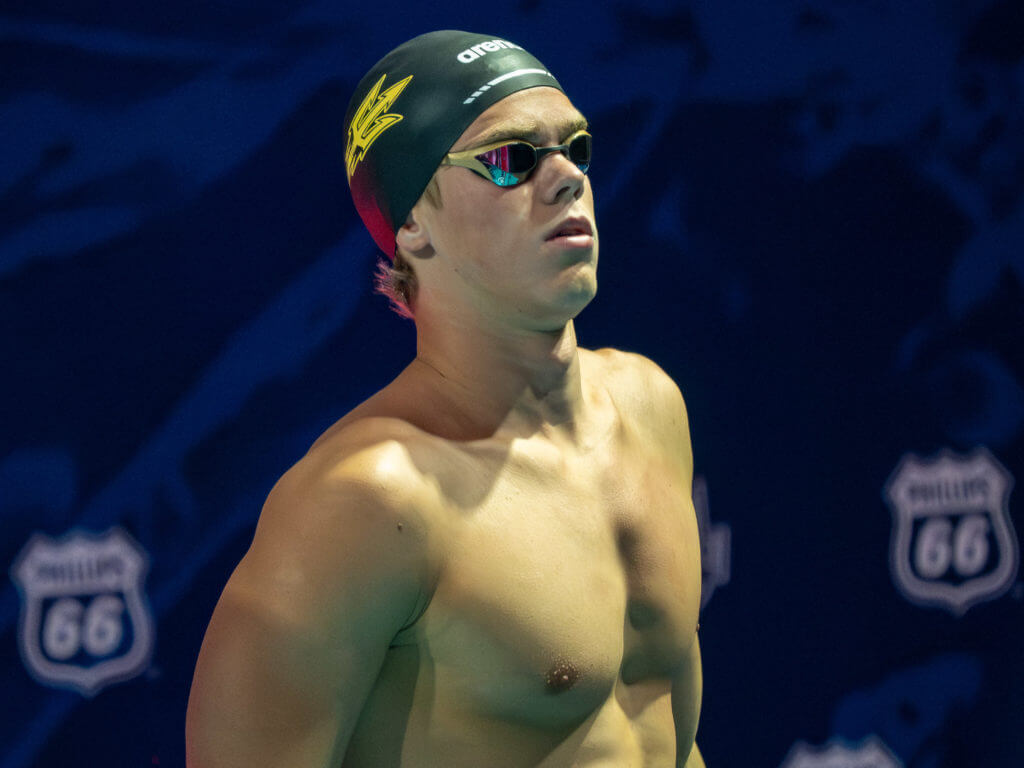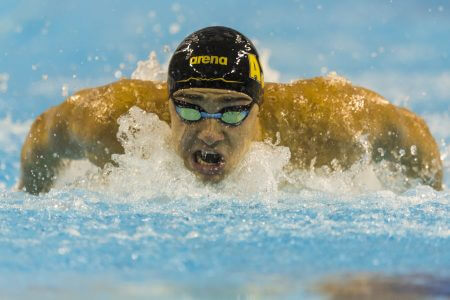Even After Massive Changes, Arizona State Men Still Have Talented Core For Title Defense

Even After Massive Changes, Arizona State Men Still Have Talented Core For Title Defense
Two days after Arizona State University won its first-ever national title in men’s swimming, the head coach who guided a nine-year renaissance departed for the same position with the University of Texas men’s team. The majority of the program’s biggest stars followed Bob Bowman out of Tempe, including two swimmers with college eligibility remaining who went on to win Olympic gold medals in Paris, Leon Marchand and Hubert Kos.
But the possibility of the Sun Devils fading back into swimming obscurity was lessened when the program promoted associate head coach Herbie Behm to the top job within minutes of Bowman’s departure. Behm, an Arizona State alum, had played a central role in elevating the program to national-title contention. Star-power matters in college swimming, but a team cannot win without sprint depth, and Behm had been the architect of a deep group that finished top-three in each relay at the 2024 NCAA Championships.
Expect more of the same in March 2025, when the Sun Devils head to Federal Way, Wash., as defending national champions. A repeat title performance? That’s a long shot given the departures; in addition to Bowman, Marchand and Kos heading to Texas, Owen McDonald and Zalan Sarkany have moved on to Indiana. Jack Dolan and Alex Colson both completed their fifth years of eligibility while David Schlicht did not return for his COVID-19 waiver year.
Still, ASU is undefeated thus far in the fall dual meet slate, which has included beating national power NC State in Raleigh and taking care of business at home this weekend when Cal and Stanford visited. Particularly impressive was the win over Cal, a team with 14 consecutive top-two finishes at the national level and the slight title favorite entering this year’s college season. Sure, Cal was missing Destin Lasco, and the teams have a different approach to dual meets, but Arizona State won 210-143 against Dave Durden’s group.

Ilya Kharun — Photo Courtesy: Michael P. Hall/Swimming Canada
At the center of Arizona State’s start has been the best swimmer returning last year, butterflyer Ilya Kharun. As a freshman, Kharun won a national title in the 200 fly and finished fourth in the 100 fly while playing a big relay role, but after winning bronze medals in both long course butterfly events while representing Canada at the Paris Olympics, he is a swimmer-of-the-year contender as a sophomore.
Against NC State, he clocked times of 43.95 and 1:38.74 in the butterfly events, the latter coming within a half-second of his NCAA-title-winning time from the previous season. He was just off those times while racing Cal and Stanford. His third event on the college level is the 50 free, and after swimming in the B-final at last year’s national meet, he has clocked times of 18.6 or better on three different occasions.
The Sun Devil freestyle contingent is again strong this season, with Jonny Kulow the team’s leading sprinter after finishing seventh in the 50 free and 13th in the 100 free at last year’s NCAA. Over the summer, Kulow narrowly missed qualifying for the final of the 50-meter free at the U.S. Olympic Trials, tying for eighth in the semifinals with Adam Chaney and then tying with Chaney again in a swim-off before the Florida swimmer got the upper hand a second tiebreaking swim.
Meanwhile, Patrick Sammon is back to provide some punch in the 100 and 200 free, and currently, Kharun, Sammon and Kulow hold the top-three spots in the national rankings in the 100 free. Three-event national scorer Daniel Matheson (500 and 1650 free and 400 IM) returns as well whiles Andy Dobrzanski (breaststroke), Filip Senc-Samardzic (sprint freestyle) and Tiago Behar (mid-distance) are all playing bigger roles than in the past. Sprinter Tommy Palmer has come over from in-state rival Arizona.
And one freshman from France could provide a big boost, although we should not expect the impact that Marchand had when he arrived three years ago as already an Olympic finalist. Lucien Vergnes was the European junior champion in the 200 breaststroke in 2022, and he won the European U-23 title one year later. Vergnes is listed on the ASU roster as a breaststroker — but he has already settled in as the backstroker on the Sun Devils’ medley relays.
Against Cal and Stanford, Vergnes led off ASU’s 200 medley relay in 20.88, well ahead of Cal veteran Bjorn Seeliger and only three tenths behind what Dolan split at last season’s NCAAs. Vergnes also won the 100 back in 45.32 and finished just behind Dobrzanski in the 100 breast (52.29). He raced the 200 back and finished just behind Cal’s Keaton Jones, who placed second at the U.S. Olympic Trials in the meters version of the event before qualifying for the Olympic final. Vergnes actually led Jones for the entire race until the more natural backstroker took over in the final lap. Vergnes also took third in the 200 IM (1:45.36), behind a pair of veterans in Stanford’s Ron Polonsky and Cal’s Gabriel Jett.
It’s too soon to measure exactly how much impact Vergnes can have individually this college season, but producing these results when he has only been swimming in the short course yards format for a few months, particularly in backstroke, is highly encouraging for the Sun Devils and their hopes of another impressive national finish.
Even with the coach who revitalized the program gone and the stars that propelled Arizona State’s title run accompanying him, Behm has the program in capable hands and showing no signs of relinquishing its new place among the college swimming elites.




Great article.
Important additional fact. ASU lost Bowman but gained Dave Salo. Bowman has been extremely effective over the last 20+ years, but if you look over the last 40, Salo’s total resume is more accomplished. And watching him on deck, he is still full of energy.
***************
And Vergnes is hugely interesting. As you said, he came advertised as a breaststroker (1:00.77/2:10.04 LCM), but he has already risen, after just 2 cracks at the the event, to #4 in the nation in the 100 Back at :45.32, ahead of two of last years ASU “A” NCAA finalists in the event, Owen McDonald (#6) and Hubert Kos (#8).
And in his FIRST EVER 200 SCY Backstroke, he lead Olympic finalist Keaton Jones to the 175, before Jones dropped a :25.60 last 50 to move by Lucien. Vergnes split the race :23.11 / :25.20 (:48.31) / :26.89 (1:15.20) / :27.12 (1:42.32), a fairly steep drop off between the 2nd and 3rd 50s, but only 0.23 between #3 and #4. It wasn’t so much a Vergnes collapse at the end as an Olympian rising up.
I was just amazed at a 1:42.32 FIRST EVER performance, for a swimmer wIth only a :56.43(2/24/24) 100 LCM Back in SwimCloud, but NO recorded time AT ALL in either SwimCloud or World Aquatics records for a 200 Back, EITHER SCM or LCM.
I’m hopeful for the season end.
*****************
Another among the staff with significant potential results is primary distance coach Logan Hirka. ASU lost an obviously significant athlete in NCAA 1650 champion Zalan Sarkany, but the result of the 1000 v Cal/Stanford suggests new or improved endurance folks may balance out that 25 point loss. The following names produced 8 points last year in the 500 and 1650. If they scored 33 this year it would match the loss of Sarkany. I expect more.
Matheson – improved; since ’24 NCAA he finaled in three events at OTs and was named to the USA SC Worlds team; against Cal/Stanford Matheson had a 4.27 PB at 8:49.26.
Reece Grady – Brit who came 1/’24; dropped over 50 sec. to 14.56.90 at Pac-12s, just 1.98 off NCAA invited time. Best 1000 last season 8:59.94. Now 8:55.49PB v Cal/Stanford.
Jacob Pins – Fr. from Iowa; dropped PB from 9:01.30 in 2/24 to 8:53.83 v Cal/Stan(Ht. 2)
Isaac Fleig – Fr. – 2024 Jr. Nat Champ 1500 LCM; dropped PB from 8:58.86 to 8:58.23.
Dylan Gravely – On 10/3/24 had PB in 1000 at 9:07.75. On USA Open Water team; just got back from top 10 finish in World Cup 10,000 (Hong Kong); first American since 2015 that high in World Cup 10,000; won Bronze medal on USA’s 4×1500 mixed relay.
Ryan King – son of former ASU 100 Back rec. holder; as HS Sr. in fall ’21, 4:53.61 500 and 1000PB a month later at 10:21.74; he was smallish and took a ‘Gap Year’ to try to improve enough to walk-on at ASU. By spring of ’22, he was 9:19.88 and walked on in fall, ’22; by 11/22 was 9:17.22 and by 11/23 was 9:10.28 (alt. adj.). This weekend he was PB 9:02.20 and stands #30 in the country, with a BULLET.
Bryce Rohr – Fr. – twice 9:13 already this season (9:09/15:25 PBs)
Two other fine distance swimmers include (but may do other events on last day):
***Jake Mason – PBs — 9:00.79 / 15:09.68; 1:45.09 200 Fly this weekend
***Micheal Hochwalt Fr.– PBs — 9:02.63 / 15:05.76; #1 400 SCY IMer out of HS.
Just what will freshman this close to the meet do? And how many of them will do it?
Schlicht already actually swam 5 NCAA meets: 1) 2019 UofA; 2020 (CANCELLED Covid-19); 2) 2021 UofA; (then transferred to ASU) 3) 2022 ASU; 4) 2023 ASU; and 5) 2024 ASU.
He had no additional Covid year option remaining.